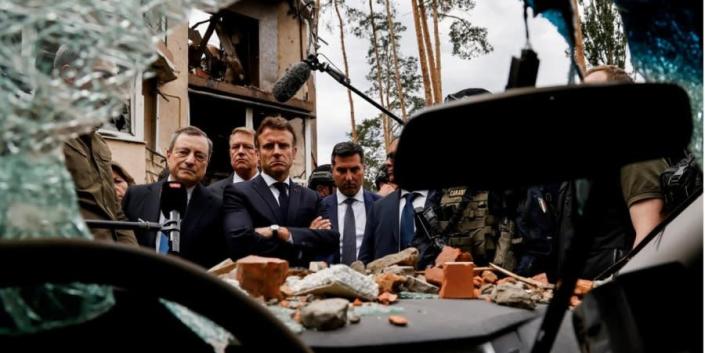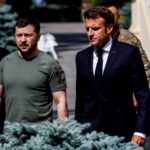
On Thursday, June 16, a train arrived at Kyiv railway station with the main EU leaders, namely French President Emmanuel Macron, German Chancellor Olaf Scholz and Italian Prime Minister Mario Draghi. Later that day, they were joined by another European leader, Romanian President Klaus Iohannis.
At first, the guests were all smiles. But when the air raid sirens started to blare over the Ukrainian capital city, and they were taken to the town of Irpin, which was ravaged by the Russian invaders, the smiles disappeared. By the time they were back in Kyiv, for a meeting with Zelensky, the European leaders even looked gloomy.
Why did they come to the Ukrainian capital city?
Delayed visit
The voyage of the leaders of the three largest EU countries to Ukraine was clearly overdue, says Oleksandr Merezhko, chairman of the parliamentary committee on international relations.
“All our true friends have already visited Kyiv,” he said in an interview with NV.
Macron’s visit to Zelensky has long been announced at the Elysee Palace, but the French leader was greatly distracted by the presidential election and the French presidency of the EU Council, said the director of the New Europe Center Ukrainian NGO, Alyona Getmanchuk.
According to Getmanchuk, Berlin had diplomatic difficulties with Kyiv – in early April, Bankova (the street where the President’s Office is located) did not want to receive German President Frank-Walter Steinmeier due to his rather warm relations with Putin. That is why the chancellor decided not to rush to visit Kyiv.
According to Getmanchuk, the Germans were probably offended because Steinmeier is an authoritative politican among the Social Democrats, including Scholz.
Still, the leaders of France and Germany finally came to Kyiv. A demonstration of Ukraine’s European unity was the official reason for the tripartite visit – especially since Macron, Scholz and Draghi arrived in Kyiv a few days before the EU summit to discuss Ukraine’s candidate status.
But the trip, according to Merezhko, turned out to be light on substance. In contrast, he mentioned the visit of Polish President Andrzej Duda to Kyiv in late May. The meeting turned out to be heartfelt, and the half-hour speech of the Pole in the parliament was filled with moving words in support of Ukraine.
Viola von Cramon-Taubadel, a MEP from the German Green Party, agrees with Merezhko’s assessment. However, she is glad that the leaders of the largest European states finally visited Ukraine.
Macron has consistently insisted on the position of “not humiliating” Russia and has regularly made statements about the need for negotiations between Ukraine and Russia. And his calls to Putin asking him to renounce the aggression against Ukraine were poorly received not only in Ukraine, but also in other parts of Europe.
Read also: Macron calls for ‘not humiliating’ Russia, speaks of ‘isolated’ Putin
After Irpin, Macron altered his former rhetoric, saying that Ukraine must determine the terms of its negotiations with Russia on its own. In addition, he promised to provide Ukraine with six more 155 mm Caesar self-propelled howitzers in addition to previously announced arms shipments. Thus, France will hand over a total of 18 Caesars to Kyiv.
Scholz has been criticized for his promises about the transfer of heavy weapons to Ukraine differing from the real pace and volume of such supplies. And Draghi is not beyond criticism either: in May, his government proposed an extremely controversial plan to end the war.
New peace plan
Political scientist Volodymyr Fesenko wrote in his column for NV that the desire to discuss with Bankova a peace plan tentatively named “Minsk III” was the non-official reason for the visit of three EU leaders at once.
Read also: Feeding the crocodile: If we allow Russia any more territorial wins, it will soon go for more
“Berlin, Paris and Rome understand that Ukraine will not agree to Russia’s peace terms. That’s why they will offer a ceasefire in exchange for a set of various bonuses,” Fesenko said.
In his opinion, these will include the assistance in obtaining EU candidate status, large-scale economic assistance in the post-war reconstruction and an agreement with (Russian dictator Vladimir) Putin to unblock Ukrainian ports.
According to Fesenko, Europeans can not only offer bonuses, but also hint at possible problems with limiting Ukraine’s military and technical and economic support if the war continues.
Merezhko agrees with Fesenko’s assessment, although he emphasizes that he has no insider information about these talks.
A source of NV on Bankova has confirmed that an attempt to discuss the outlines of the peace plan was one of the tripartite visit’s goals. Its details are unknown, but probably the guests wanted to take Zelensky’s word that he is ready for a peace agreement with Russia.
Read also: Kyiv still lacks weapons, but Ukraine will definitely regain territories – Danilov
“They (European guests) are frightened by the prospect of a long war and its economic consequences for Europe,” the source told NV, adding that in order to maintain the level of support in their countries, Macron, Scholz and Draghi must show that they are directing Zelensky in search of a path to peace.
However, the Ukrainian side does not intend to reciprocate such signals from Europeans.
The source also explains that Germany’s Social Democrats have a philosophy of comfortable coexistence with Russia. That is why Germany’s current military aid is “meager.” According to the source, the Germans could provide Ukraine with a sufficient number of PzH 200 howitzers and Leopard tanks, but Berlin chose a strategy of financial assistance instead of military and technical aid.
Read also: French arms firm busts sanctions to help Russia build weapons
Cramon-Taubadel agrees with this assessment. According to her, Germany has made many statements about helping Ukraine, but so far Berlin’s words are at odds with its deeds.
In an interview with NV, the MEP also expressed concern that the leaders of France, Germany and Italy could persuade Zelensky to start peace talks.
“I would like Scholz to listen to Ukraine, to their expectations and demands, because Ukraine quite rightly expects more military aid from Europe’s first economy,” said Cramon-Taubadel.
Getmanchuk believes that the desire to understand the situation at the front and understand how far Zelensky and the Ukrainians are ready to go in the war against Russia was the key reason for the European leaders’ visit.
However, Getmanchuk does not deny that European leaders are also obsessed with the need to conclude a peace agreement between Ukraine and the aggressor country. According to her, Macron, Scholz and Draghi tend to believe that the fastest way to achieve peace in Europe is if Ukraine initiates negotiations with Russia because of a lack of weapons and resources.
The international expert says that this very fact has caused a slow pace of arms supplies and delays in preparations for the imposition of new packages of European sanctions against Russia.
But Kyiv, in her opinion, takes the opposite view: peace will be made when Ukraine receives enough weapons not only to stop the aggressor, but also to liberate the occupied territories.
She calls such a German-French approach a fundamental mistake, because if Ukraine is unable to defend itself in the Donbas, the war will continue in the rest of Ukraine. And then Putin will move on.
All of NV’s interlocutors hope that the direct contact of Ukraine’s European guests with the realities of the war will sober them up. Their visit to Irpin will change their hopes of appeasing the Moscow dictator with concessions from Kyiv, and help launch a European lend-lease, NV’s sources hope.
NV attended a meeting of journalists with Macron in Kyiv. The French leader indeed looked stunned by what he saw on his trip to Irpin.
Following a conversation with the French president, NV expressed its conviction that Ukraine will be granted the status of a candidate for EU membership without additional conditions. But to join the European family, the country will have to implement a very difficult “road map.”
Macron, in turn, confirmed that Western countries are deliberately not supplying assault aircraft and tanks to Ukraine.




